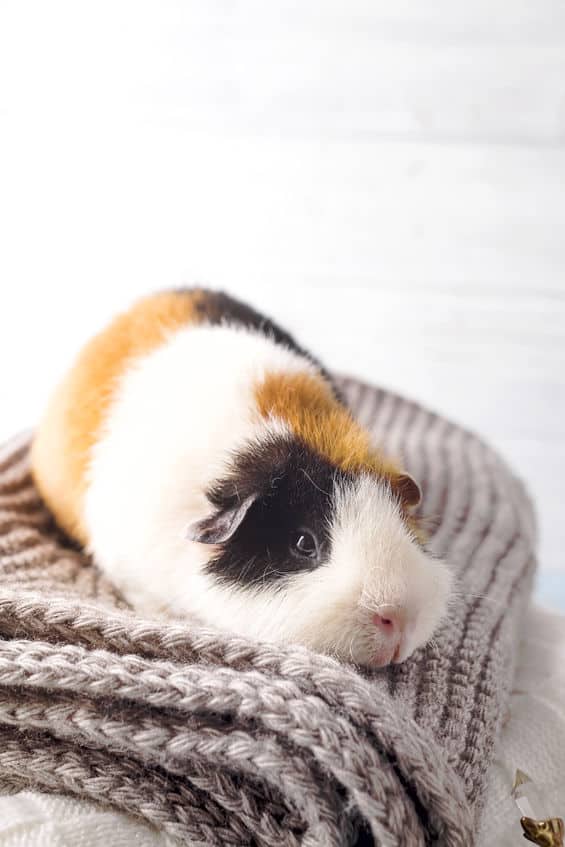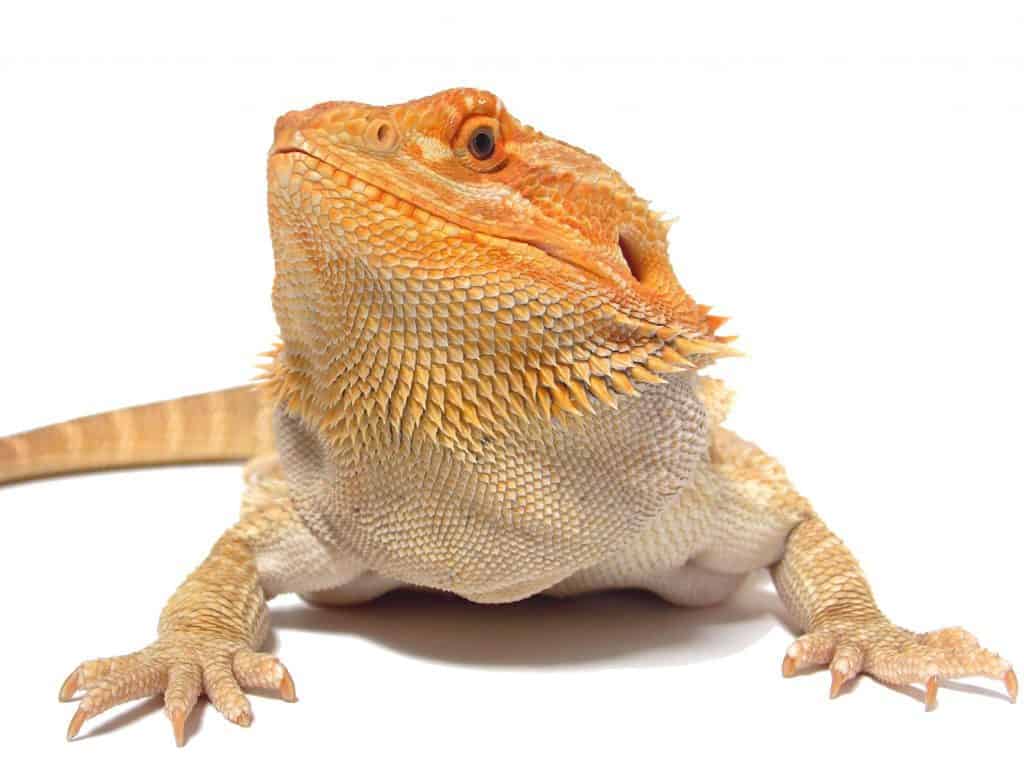Ferrets as Pets: how much do ferrets cost? What is Their Aggressiveness and Life Expectancy?
Ferrets have become very popular pets in the last couple of years. They are known to be friendly and fun to have around, and many people own and love them. Ferrets may not cost much to buy, but there are also ongoing expenses such as vet bills, emergency care, medication, and proper nutrition.
It’s essential to invest in a reputable breeder, who can provide you with a healthy ferret and a rabies vaccine. Another option is a ferret shelter, where ferrets will have been checked over by a vet and may have a long history.

how much do ferrets cost?
The price of a ferret can vary a great deal being anywhere from $50 to $250. Ferrets are not very aggressive animals, but they do need to be trained not to bite or nip when they are young. Ferrets can live anywhere from 5 to 12 years, depending on how they are bred and cared for.
How much do ferrets cost, how aggressive are they, and how long do they live? Here’s what you need to know.
This is just the tip of the iceberg when it comes to owning a ferret. Below you will find information on the cost of ferrets, the aggressiveness of ferrets and how to deal with it, the life expectancy of a ferret, and more.
They’re cuddly than a bearded dragon or turtle, but they might bite. They may not need as much expensive equipment as, say, a sugar glider, or fennec fox, but they do need a lot of stuff.
If you’re thinking about something a little bit easier, a guinea pig is a good option.
If you are interested in learning all the ins and outs of owning a ferret, keep reading.

The Cost of Buying a Ferret
As everyone knows, buying a pet comes with more than just purchasing the actual animal. There is a lot more that goes into making sure your new furry friend has a good home to go to. You need to keep your ferret healthy, whcih involves plenty of ferret toys and toys designed for other purposes that work well for many ferret owners. You will also have to ferret proof your home and save for ferret vet bills.
Before buying a ferret it is important to be prepared and ready with all the necessary materials.
| Item | Cost (On Average) |
| Ferret | $100 |
| Cage | $110 |
| Cage Accessories | $34 |
| Bedding | $15 |
| Food (dry) | $15 |
| Veterinary Fees | $200 |
| Total | $474 |
The first and main purchase will be the actual ferret itself. The cost of a ferret can range anywhere from $50 to $250 depending on where you get them, how old they are, and what type of ferret they are. If you want the most luxurious ferret cage or plan to ferret proof your whole house, expect o pay more.
According to Cost Helper Pets,
The cost of a ferret varies depending on factors such as the breed, location, and age. The cheapest breed is the White Albino Ferret, which costs between $50 to $130. Marshall ferrets are the most commonly sold ferrets and cost around $150 to $250.
The next cheapest is the Sable Ferret mixes, their price is about $130. The Most expensive is the Black Sable Ferret which price ranges from $75 to $250.
Private breeders may sell color variety ferrets for up to $1,000. A private breeder will be more likely to be able to give you a direct family history of the ferret and you will know exactly what you are getting.
Older ferrets are often more affordable. A ferret owner desperate to find anew home often is willing to accept lower payments or even give ferrets away for free, but it may be harder to keep a ferret healthy when they have come from these situations.
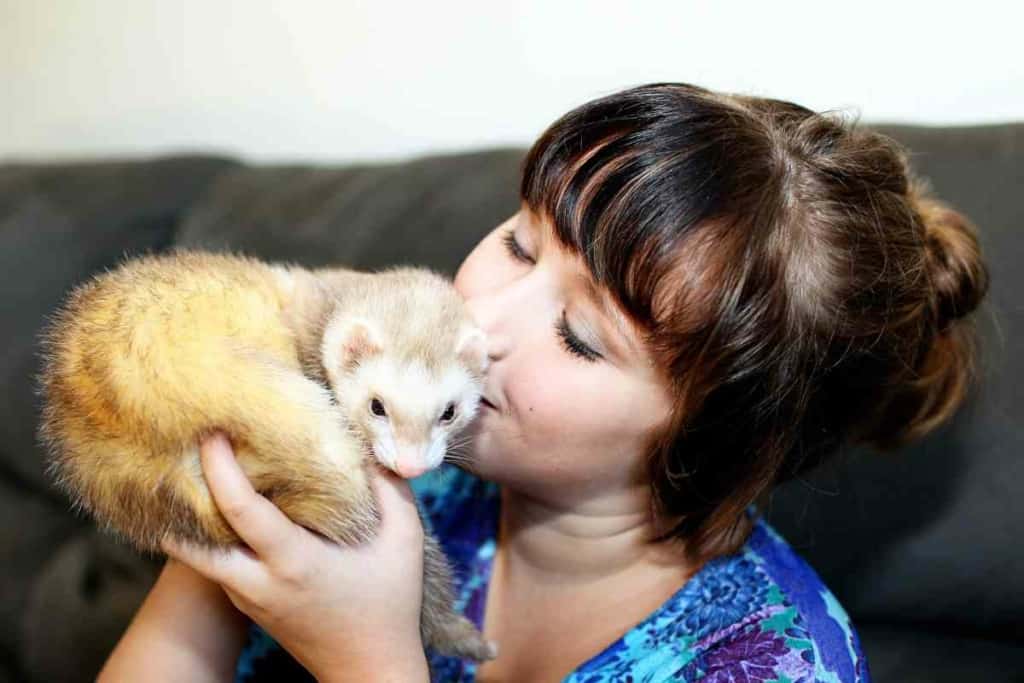
Age also affects the price, as baby ferrets are in higher demand and cost more than adult ferrets. Adopting a ferret can be cheaper, with adoption fees starting at $15 or even being free. On average, a ferret costs around $100.
After acquiring a ferret, you need to provide a habitat for it, which includes a cage, cage accessories, and bedding. A cage should be at least 2 feet wide, 2 feet long, and 3 feet high to provide enough room for your ferret to play and move around. Many ferret cages have multiple tiers for climbing.
An appropriate cage will cost around $110, though it can be more or less depending on the cage you choose. I found an example of a good one on Amazon:
$474 is the average start-up cost of owning a pet ferret.
The next things you need to purchase are cage accessories and bedding. You can accumulate the accessories across the duration of time you have your ferret, but the very minimum you should start with is a sleeping hut, a food dish, and a water bottle. One or two ferrets will go through a lot of ferret toys and need a separate water bottle and food dish.
Ferrets need a shelter to sleep in, you can purchase a basic one for around $9.
Ferrets also need a dish for their food preferably one that hooks to the side of their cage to prevent food from spilling or getting lost in the bedding of the cage. This will cost about $15 for a basic one. I found one on Amazon.
Ferrets require a water bottle on the outside of their cage that they can access through a drinking tube to keep them hydrated and prevent water from being spilled. This typically costs around $10. Pet bedding is also necessary to keep the cage cleaner and more comfortable, with odor control bedding recommended, and usually costs around $15.
Ferret food can be wet or dry and can be purchased at a pet store or online, with dry food averaging $15 a bag and wet food around $20 for a 12 pack. The best diet for a ferret is varied. Your new ferret will gain weight quickly without the best diet and end up with health problems, so put good food into your monthly costs.
It’s important to get your ferret vaccinated, spayed or neutered, which can cost around $200 initially, with regular check-ups and vaccinations also required.
The initial costs of spaying or neutering are well worth avoiding the emergency situations that come up when ferrets fight and avoids the smell and behavior problems that come as your new pet matures. Most ferrets have better behavior and health when they’re fixed.
This totals up to be about $474 to start up. Before purchasing a ferret make sure you are prepared for the additional costs so you aren’t overwhelmed with the amount of money that goes into purchasing a f
erret .
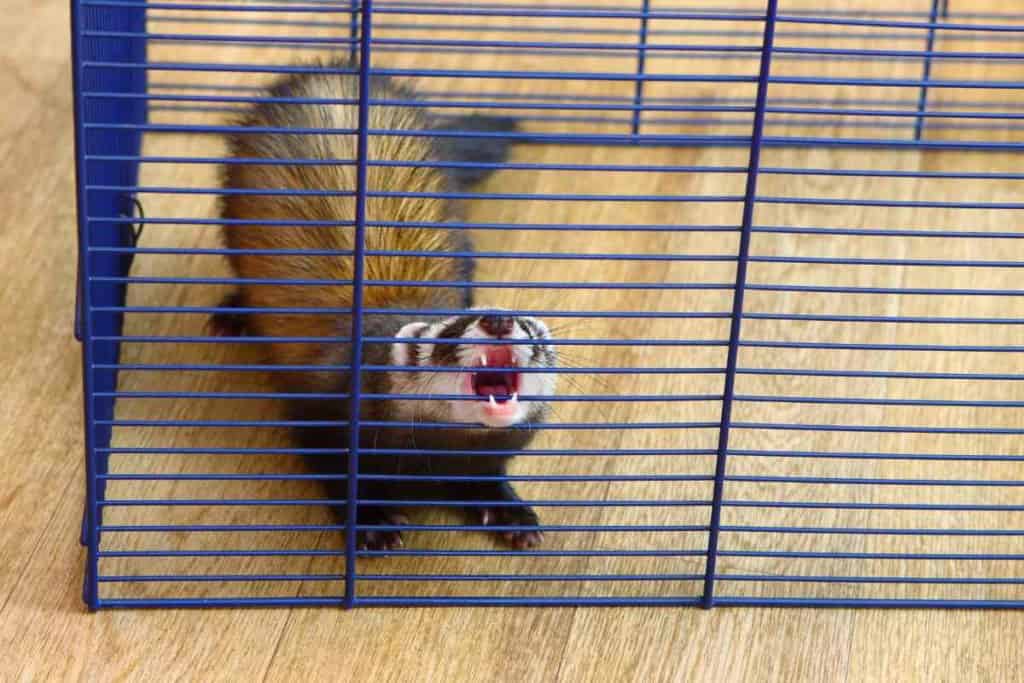
Ferret Aggression and How to Deal With It

Ferrets are domesticated animals and have been kept as pets for thousands of years. This means that they are used to being around humans, and are not normally aggressive toward them.
When ferrets are young, they may bite or nip when playing or teething. Just like puppies or kittens, this behavior needs to be trained out. They usually don’t have malicious intent. F
Make it clear to your ferret that biting and nipping is not appropriate behavior and as they mature and learn, the biting will stop.
If your ferret is being deliberately aggressive, especially if it is not normal behavior for them, this is usually a sign that something is wrong. This can happen if you aren’t letting your ferret out of its cage enough or not letting it get enough exercise.
Ferrets are very active animals so if they can’t release that energy, they will start focusing it on more destructive behaviors such as biting or being aggressive.
One or two ferrets can play together or with other exotic pets or cats. When you get a ferret, think about how they will stay entertained and learn bite inhibition.
Most ferrets benefit greatly from having a friend to help them become good pets, but their reaction to a new pet will vary depending on age and personality.
Ferrets are actually used to being around humans and are not normally aggressive toward them.
It can also be a sign that your ferret is in pain. If your ferret suddenly starts biting when you pet them or try to hold them, it could be a sign that the contact hurts them. If you are letting them out enough and nothing has happened to cause a change in behavior, you should take them to a vet to have them checked out.
They may also bite if they are scared or feel as if they are in danger. If you try to pick them up while they are sleeping, or catch them off guard, they may respond defensively and bite you. Always make sure they know you are there, by making your presence known.
Talk to them, reach your hand in and pet them, and when picking them up, grab them slowly and gently to prevent frightening them.
Ferrets were domesticated and bred to hunt rodents, so it is not a good idea to have a ferret if you have rabbits, guinea pigs, other similar rodents and reptiles unless you plan to keep them separated at all times.
Your ferret may end up hurting or killing them out of instinct. Other small animals that also have predator instincts, like foxes or cats, may be able to play, especially if you start with baby ferrets and other animals.
They can, however, get along and bond with dogs and cats. Just be sure your dog or cat doesn’t hurt your ferret. If your ferret gets too aggressive with other pets, keep your ferret away for some time.
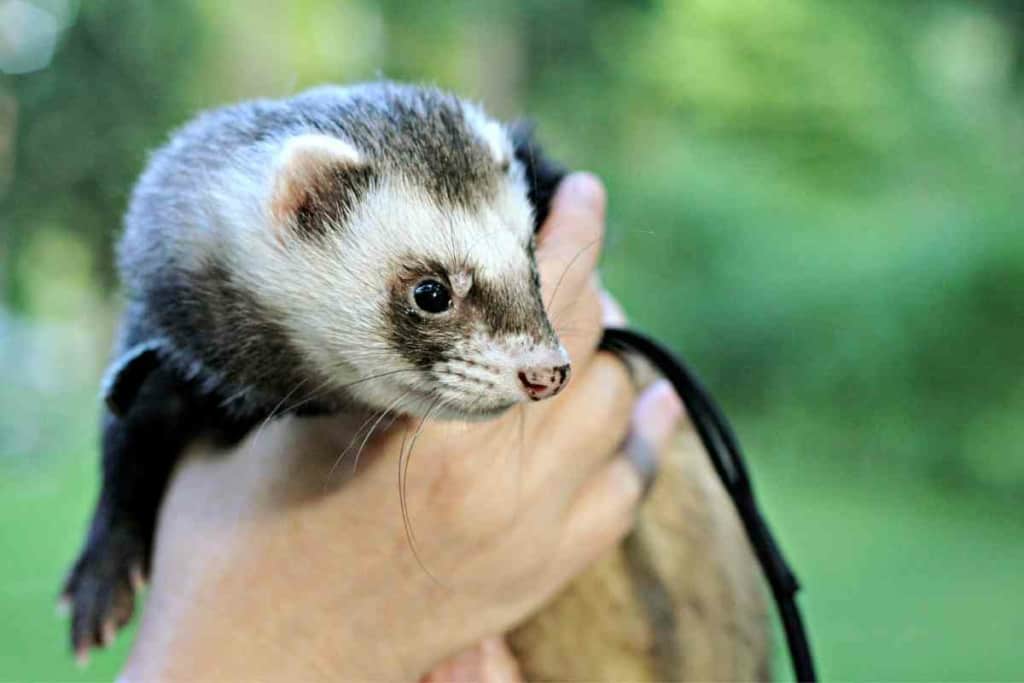
The Life Expectancy of a Ferret
The lifespan of a ferret is a little bit more complicated than the average life span of more common pets such as a dog or cat, as many factors go into how long a ferret lives.
Ferrets were first popularized in Europe as household pets, in which they lived about 8 to 10 years. Throughout the years, and spreading to different countries have shortened their life span to about 5 to 9 years.
Another thing that can determine their life expectancy is if they were purchased from a pet store or a private breeder. As told by PetMD:
“…The lifespan difference between a ferret purchased from a breeder compared to a ferret purchased from a pet store may have to do with how early the ferret was spayed or neutered. Ferrets in pet stores are fixed before they go into the pet store, so you’re looking at the ferrets being fixed at like five weeks of age, whereas a breeder will recommend you wait until a ferret is at least a year old. That way, it’s had all of its hormones fully developed.”
PetMD
It really just depends on your ferret. When purchasing a ferret, you should plan on caring for it for the maximum amount of time. Ferrets are long-term commitments, so be sure that you will be able to care for it and keep it for several years when purchasing it.

Ferret Health Requirements
- Food: Ferrets are obligate carnivores, which means that their diet should consist of whole prey or high-quality ferret kibble, high in animal-based protein and fat. It’s recommended to feed them a diet of whole prey or high-quality ferret kibble. Additionally, it’s essential to provide them with fresh water daily in water bowls.
- Companionship: Ferrets are highly social animals and require companionship, so it’s recommended to have at least two ferrets. They are also highly active and playful, enjoying toys such as cat toys and sleep sacks. They also interact well with other pets like cats, but you should always supervise their interaction. Ferrets love to play, cuddle, and hide, so it’s essential to provide them with plenty of toys, hidey-holes, and blankets to keep them entertained.
- Safe housing: Invest in ferret-proofing your home to prevent any accidents or escapes. Ferrets have a curious nature and love to explore their surroundings.
- Vaccinate: Against illnesses such as canine distemper and insulinoma, so it’s essential to recognize the signs of illness and take them to the vet as soon as possible.
- When it comes to litter training, ferrets are generally quick learners. It’s recommended to use litter pans with high sides to prevent them from pooping outside the box. In addition, it’s essential to clean their litter box regularly to prevent any parasites or health issues.
- Monitor everyday health: Ferrets are prone to ear infections, so check their ears regularly for any signs of infection. Additionally, they have delicate spines, so it’s important to handle them gently. Clip their nails regularly to avoid snags. In case of injury or illness, it’s important to be prepared with emergency funds for vet costs and treatment.

How to Care for a Ferret
Ferrets are high maintenance pets and require a lot of care and attention to living happy and healthy lives. They aren’t the best option for someone who doesn’t have a lot of time to care for and spend time with their ferret.
Here are some things you need to know about caring for a ferret before you purchase one.
#1: How to Properly Feed Your Ferret
Ferrets have a very high metabolism, which means they need to eat a lot throughout the day. They should be fed a small scoop of food 8 to 10 times a day to stay full and healthy. Don’t worry too much about over-feeding as Ferrets are known to only eat until they are full, and because they are so active and have such a high metabolism, they need a lot of food.
Ferrets are carnivores which mean they only eat meat. You should feed them dry ferret food which has all the nutrients they need. This can be kind of difficult to find so many people feed their ferret kitten food because ferrets and cats have very similar diets and need the same nutrients.
Avoid fish flavored kitten food, as this can make your ferrets smell very bad.
You can also give your ferret raw chicken or cooked chicken in addition to the food pellets for added protein and nutrients. You can also give them chicken baby food in addition to pellets.
There are wet ferret food options, but they should only be used in addition to dry food, as dry food is necessary for teeth strength, and keeping their teeth clean.
Do not feed your ferret dog food as this does not have the nutrients that they need. It may fill them up, but it won’t give them any nutritional value. Do not feed your ferret human foods or snacks as this can make them very sick and sometimes even kill them.
#2: Providing Proper Housing for Your Ferret
Ferrets need a lot of space to move around and play, and they can get bored quickly if they don’t have enough stimulation. Here are some tips on ferret cages and housing:
- Cage Size: A baby ferret will need a smaller cage, but as they grow, they will require more space. A good rule of thumb is to have at least one square foot of floor space per ferret. A Ferret Nation cage is a popular choice for ferret owners, as it provides ample space and has multiple levels for your ferrets to explore.
- Ferret Proofing: Ferrets are notorious for getting into everything, so it’s important to make sure their environment is safe. Ferret proofing your home and the cage is essential to keep your pet healthy and out of harm’s way. This means securing loose wires, removing toxic plants, and ensuring your ferret can’t escape from their cage.
- Cage Accessories: Ferrets need toys and accessories to keep them entertained and stimulated. Provide your ferret with hammocks, tunnels, and balls to play with. Ferrets also love to climb, so make sure their cage has multiple levels to explore.
- Cleaning: Keeping your ferret’s cage clean is essential for their health. Ferrets can be messy, so it’s important to clean their cage regularly. Use safe cleaning products and replace their bedding often to prevent the buildup of bacteria.
- Costs: While it may be tempting to save money by purchasing a smaller cage, it’s important to keep in mind the long-term costs of providing a comfortable and stimulating environment for your pet.
A spacious and stimulating cage, along with proper ferret proofing and cleaning, can make all the difference.
#3: Give Your Ferret Lots of Attention

Ferrets are needy and social animals. They need a lot of attention and time to keep them out of trouble. A lot of owners will get two or more ferrets to keep each other entertained, but if you only want one you are going to need to spend at least 2 to 3 hours a day hanging out with your f
If you neglect to take your ferret out of their cage enough, they will focus that cooped up energy on punishing you. Owners have reported their ferrets tearing things up, throwing their food, and breaking accessories in their cage when they have been ignored for an extended amount of time.
You should let your ferret out of their cage and play with them every single day. Ferrets are social animals that need to create bonds with other ferrets or people. Some of the best ways to bond with your ferret is to hold them and let them come around the house with you or even take them on walks.
You can buy ferret harnesses that allow you to walk them on a leash. Ferrets are very active and love to play so many times just by letting them out of their cage, they will try to engage in playing with you.
You need to figure out what your ferret likes to do to play. Some ferrets like to be chased around the room, some like to play tug of war, and some like to pounce on your feet to get attention. Figure out what your ferret likes.
You can also spend time with your ferret by training them. Ferrets are intelligent animals and can be trained to do certain tricks.
#4: Groom Your Ferret
Ferrets are just like any other household pet in that they need to be groomed. This will help you keep them clean and healthy, and reduce the smell of having a small animal living in your house.
You should brush them at least once a week to keep their fur from getting knotted or matted. This will also keep out anything that may get caught in their fur and keep them more comfortable and reduce the amount you have to bathe them.
Ferrets should also be bathed once every couple of months or as needed just to keep them nice and clean, and reduce the chance for them to get some kind of bacteria or get sick.
When I was younger I really wanted a Ferret, but my mom would never let me get one because “they smell bad”. That’s one thing that everyone seems to know about ferrets. They do indeed smell bad.
This scent cannot be washed away, so while ferrets need to be bathed once every couple of months, you should not over bathe them in an attempt to get rid of the smell.
It will not go away and overwashing will do more harm than good. If you wash your ferret too much, it could cause their skin to dry out and get itchy, which will cause the skin to produce more oil, making the scent stronger.
Many ferrets, especially those from pet stores are de-scented, so the natural odor they have is underwhelming and not very noticeable.
Many Ferrets, especially those from pet stores, are de-scented.
Make sure you are giving your ferret dry food, as this helps to keep their teeth clean and healthy, but you will still need to brush their teeth around once or twice a month, as ferrets are prone to several teeth and mouth diseases. By keeping your ferret’s mouth clean, you are reducing their chance of getting these diseases.
There are several ways you can go about brushing your ferret’s teeth. The first one is with a pet toothbrush and pet toothpaste. Odds are your local pet store is not going to have a toothbrush and toothpaste specifically made for a ferret, but ones made for puppies and kittens will be small enough and work just as well for your ferret.
Before going straight into brushing your ferret’s teeth you need to get them used to having their face and mouth touched. You can do this by gently massaging their face, cheeks, and gums for about 30-second intervals several times a day for a week leading up to brushing their teeth.
Reward them afterward so they associate with their face being touched as a good thing. This way when you go into brush their teeth for real, they won’t be frightened or confused.
Other ways you can clean their teeth is by giving them teeth cleaning treats such as the ones made for kittens or puppies, just watch them to make sure they don’t choke on them.
If you have the money, you can take them into the vet to have their teeth professionally cleaned regularly but this option can get very pricey.
#5: Set Up Regular Veterinarian Visits for Your Pet Ferret
Ferrets are prone to many diseases and sicknesses that they need to be vaccinated for yearly. Any animal that lives in the same space as you should go into the vet at least once a year for vaccinations and check-ups to keep them safe and healthy.
Ferrets are no exception and they shouldn’t be neglected when it comes to making sure they stay healthy.
Origin of Ferrets
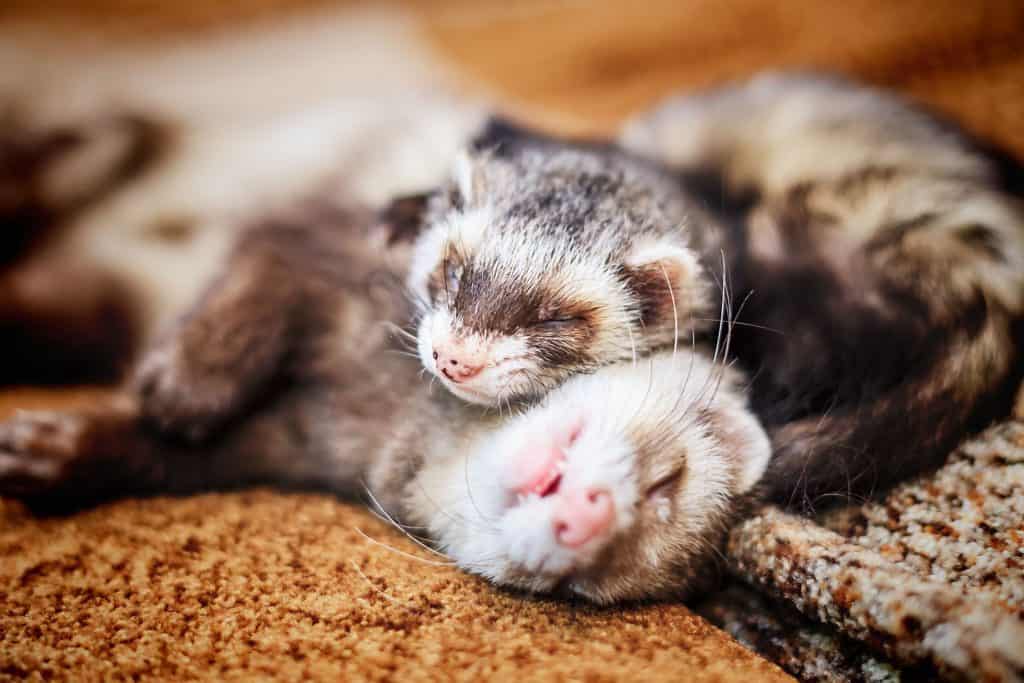
Common Name: Domestic Ferret
Scientific Name: Mustela putorius furo (stinky little thief)
Type: Mammal
Diet: Carnivore (meat eater)
Ferrets have been domesticated and kept as pets for thousands of years, and are no longer found in the wild. They have even found hieroglyphics that show people walking f
Modern f
It is thought that ferrets were originally Polecats that were caught and domesticated, but through thousands of years of domestication and breeding, ferrets are now genetically separate from Polecats, which can still be found in the wilds of Europe and Asia.
They were first used as working animals, much like early dogs and cats, to help catch mice and rodents because they were smaller and thinner than cats and could follow the rodents into their holes making them a more efficient hunter.
| Differences | Polecat | Ferret |
| Size | 12-18 inches long | 11-16 inches long |
| Domesticated | No | Yes |
| Color | Darker Shades | Lighter Shades |
Ferrets first appeared in America around 300 years ago, when early colonists brought them over on their boats for rat control. They are still used on some boats and in barns for rodent control in countries such as Canada and Australia, but using ferrets to hunt is now illegal in America.
Many people mistake ferrets as still being out in the wild because of the endangered Black-footed Ferrets, which are still in the wild. But they are just about as much related to each other as wolves and household dogs are.
Their scientific name, Mustela putorius
The reason that ferrets make such amazing and loving pets is because they’ve been doing it for thousands of years.
Related Questions
How much do ferrets sleep? Ferrets sleep around 14 to 18 hours a day. Ferrets are very active animals that love to play and exercise while they are awake. This means that they need more sleep, because of all the energy they burn throughout the day.
How big do Ferrets get? Ferrets will be fully grown by four months old. Male Ferrets will be about 16 inches long from nose to tail and weigh about 2.5 pounds. Female ferrets are smaller and will be about 12 inches long from nose to tail and weigh about 1.5 pounds.
Do Ferrets recognize their owners? Ferrets do bond with and create a relationship with their family. They are very social animals that love attention and can create bonds with people in almost the same way as a dog or cat would.
Related Articles Just For You!
If you’re trying to decide what small pet to buy, I suggest checking out one of these other articles.
- Ferrets are domesticated animals that have been kept as pets for thousands of years
- Young ferrets may nip or bite, but it can be trained out of them
- Deliberate aggression may be a sign of something wrong, such as not enough exercise or pain
- Ferrets can get along with dogs and cats, but not recommended to have them around other small rodents or reptiles
- Ferret lifespan ranges from 5 to 9 years and can be influenced by where they were purchased
- Ferrets are a long-term commitment and require proper care and attention
- Consider the cost of owning a ferret, including buying a cage, kibble, vaccines, check-ups, and other health issues.
- Adopting from shelters or rescue organizations may be cheaper than buying from breeders
- Make sure to budget for the cost of owning a ferret, including monthly expenses
- Ensure that you are able to care for a ferret for its maximum lifespan before adopting or buying one.
- Commonly used supplies:
- Hammocks
- Bowls
- Carriers
- Litter boxes and pans
- Ferret litter
- Shampoo
- Ferrets are between $50 and $250, with an average of $100
- Albino ferrets are the cheapest, while black sable ferrets are the most expensive
- Prices also vary based on age and where they are purchased (pet store vs private breeder)
- Total start-up cost is about $474, including:
- Ferret ($100)
- Cage ($110)
- Cage accessories ($34)
- Bedding ($15)
- Food ($15)
- Veterinary fees ($200)
- Ferret cages should be at least 2ft x 2ft x 3ft and cost around $110
- Accessories needed include a sleeping hut ($9), food dish ($15), and water bottle ($10)
- Ferret litter, shampoo, and a rabies vaccine are also necessary for their care
- Ferrets are high maintenance pets that require a lot of care and attention.
- Ferrets have a high metabolism and need to eat a small scoop of food 8 to 10 times a day.
- Ferrets are carnivores and should be fed dry ferret food or kitten food.
- Ferrets need large cages with sleeping huts, toys, and proper bedding.
- Ferrets are social animals and need a lot of attention and time with their owners.
- Neglecting a ferret can result in destructive behavior.
- Ferrets require routine veterinary check-ups and vaccinations.
- Ferrets need to be litter trained.
- Ferrets can be adopted from shelters or purchased from pet stores or breeders.
- The cost of a ferret varies depending on where it is purchased and the supplies needed to keep it healthy.
- Owners should understand the responsibility and commitment of owning a ferret before making the decision to adopt one.





